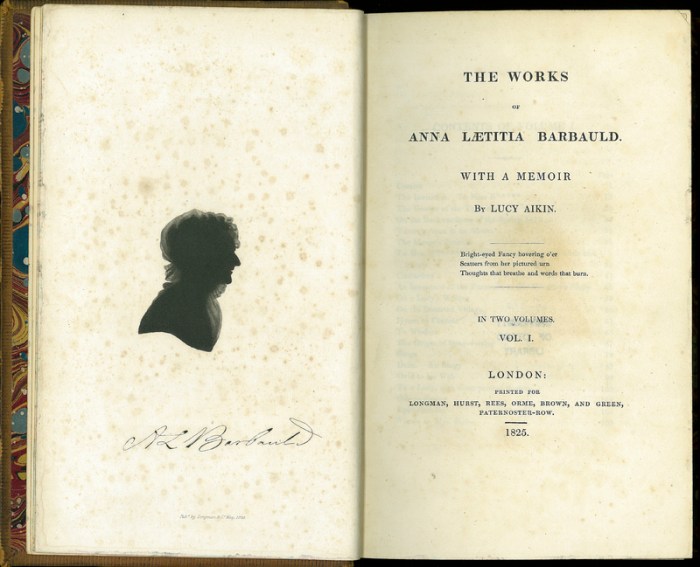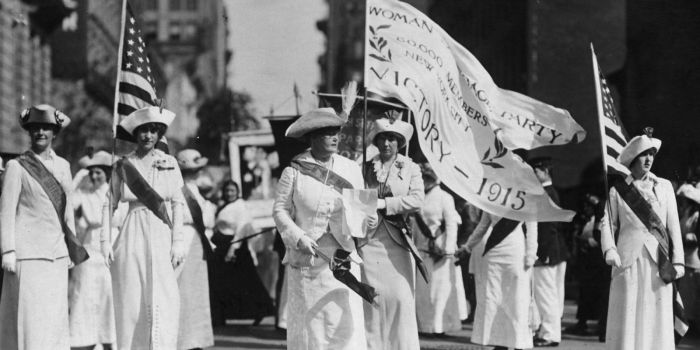The rights of woman barbauld – The Rights of Woman by Barbauld stands as a groundbreaking work that ignited the discussion on women’s rights during the 18th century. Its bold arguments and insightful analysis challenged prevailing societal norms, laying the foundation for feminist thought and inspiring generations to come.
Barbauld’s work examined the social and political constraints faced by women, arguing that they were rational beings deserving of the same opportunities as men. She critiqued the traditional education system, which she believed hindered women’s intellectual development and limited their participation in society.
The Rights of Woman
Mary Wollstonecraft’s “A Vindication of the Rights of Woman” was a groundbreaking work that challenged prevailing views on women’s roles and rights during the 18th century. This period was characterized by deep-rooted societal norms that limited women’s access to education, property ownership, and political participation.
Historical Context
- Social Views:Women were seen as inferior to men, primarily responsible for domestic duties and childrearing.
- Political Views:Women were denied the right to vote, hold public office, or own property independently.
- Educational Restrictions:Women had limited access to formal education, which further reinforced their perceived inferiority.
Wollstonecraft’s Challenge
- Education:Wollstonecraft argued that women should have access to the same education as men, as it was essential for their intellectual and moral development.
- Equality:She challenged the notion of women’s inferiority, asserting that they were equally capable of reason and virtue as men.
- Political Rights:Wollstonecraft advocated for women’s right to participate in political life, including the right to vote and hold public office.
Key Arguments in “A Vindication of the Rights of Woman”

Mary Wollstonecraft’s seminal work, “A Vindication of the Rights of Woman,” is a powerful and influential treatise that challenges the prevailing notions of female inferiority and argues for the equality of women.
Rationality and Rights
Wollstonecraft asserts that women are rational beings, capable of reason and independent thought. She rejects the prevailing view that women are naturally inferior to men and argues that they are entitled to the same rights and opportunities as men, including the right to education, employment, and political participation.
Critique of Female Education, The rights of woman barbauld
Wollstonecraft strongly criticizes the traditional education system for women, which she argues is designed to perpetuate female dependence and passivity. She argues that women should be educated in the same subjects as men and given the opportunity to develop their intellectual capacities.
By denying women access to education, Wollstonecraft argues, society limits their potential and perpetuates the cycle of female subordination.
Education and the Development of Women: The Rights Of Woman Barbauld

Wollstonecraft believed that education was crucial for the development of women. She argued that women were capable of intellectual achievement and that they should be given the same opportunities as men to learn and grow. She believed that education could empower women and enable them to participate fully in society.
Wollstonecraft proposed a number of specific educational reforms for women. She argued that women should be taught the same subjects as men, including mathematics, science, and history. She also believed that women should be given the opportunity to attend university.
She believed that these reforms would help women to develop their intellectual capacities and to become more independent and self-sufficient.
Women’s Intellectual Abilities
Wollstonecraft believed that women were just as capable of intellectual achievement as men. She argued that the only reason women were seen as less intelligent was because they were denied the same opportunities to learn and grow. She pointed out that many women had made significant contributions to society, despite the obstacles they faced.
The Importance of Education for Women
Wollstonecraft believed that education was essential for women’s development. She argued that education could help women to become more independent and self-sufficient. She also believed that education could help women to develop their intellectual capacities and to become more active participants in society.
The rights of women have been a topic of debate for centuries, and one of the most influential voices in this discussion was Anna Barbauld. Her writings on the subject were groundbreaking and helped to shape the way we think about gender equality today.
For those interested in further exploring the topic of women’s rights, I recommend checking out this article on words that end with phobia . Returning to Barbauld’s work, her ideas continue to resonate with us today and remind us of the importance of fighting for equality for all.
Women’s Roles in Society

Wollstonecraft challenged the traditional notions of women’s roles as wives and mothers. She believed that women were capable of much more than just being subservient to men. She argued that women should be educated and have the opportunity to work and participate in political life.
Education and Work
Wollstonecraft believed that education was essential for women. She argued that women should be educated in the same way as men, so that they could be independent and self-sufficient. She also believed that women should have the opportunity to work and earn their own money.
She argued that this would give women more control over their own lives and make them less dependent on men.
Political Participation
Wollstonecraft also believed that women should have the right to participate in political life. She argued that women were just as capable as men of understanding politics and making decisions about how society should be run. She believed that women should be allowed to vote and hold political office.
Impact and Legacy of “A Vindication of the Rights of Woman”

Upon its publication in 1792, “A Vindication of the Rights of Woman” sparked immediate controversy and generated a wide range of responses. Some readers were deeply offended by Wollstonecraft’s radical ideas, while others were inspired by her passionate defense of women’s rights.
The work played a pivotal role in the development of feminist thought. It challenged the prevailing notions of women’s inferiority and argued for their equal access to education, employment, and political participation. Wollstonecraft’s ideas resonated with many women who had long felt stifled by the constraints of their traditional roles.
Legacy of Wollstonecraft’s Ideas
Wollstonecraft’s legacy continues to inspire contemporary debates about gender equality. Her ideas about the importance of education for women and the need to challenge traditional gender roles remain relevant today.
- Influence on Feminist Thought:Wollstonecraft’s work laid the foundation for the feminist movement, providing a framework for arguing for women’s rights and equality.
- Educational Reforms:Her emphasis on the importance of education for women contributed to the establishment of girls’ schools and the expansion of educational opportunities for women.
- Challenging Gender Roles:Wollstonecraft’s ideas challenged traditional gender roles and encouraged women to pursue intellectual and professional pursuits.
- Inspiration for Activists:Wollstonecraft’s writings continue to inspire activists and advocates working to promote gender equality and women’s rights.
FAQ Compilation
What was the main argument of The Rights of Woman?
Barbauld argued that women were rational beings deserving of the same rights and opportunities as men, and that they should be educated to participate fully in society.
How did Barbauld challenge traditional notions of women’s roles?
She argued that women were not destined to be solely wives and mothers, and that they were capable of playing important roles in society, including in the workforce and in politics.
What is the legacy of The Rights of Woman?
The work has been highly influential in the development of feminist thought and the women’s rights movement, and it continues to inspire activists and scholars today.